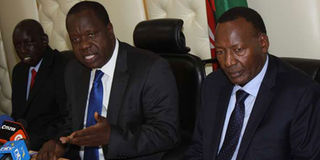Sacking of the agency’s board over test irregularities was long overdue

Interior Cabinet Secretary Joseph Nkaissery (right) with Education CS Fred Matiang'i (centre) and Principal Secretary Belio Kipsang during a press conference at Jogoo House, Nairobi, on March 24, 2016 PHOTO | ANTHONY OMUYA | NATION MEDIA GROUP
What you need to know:
Last year’s Kenya Certificate of Secondary Education exam proved to have been the most disgraceful.
This is unprecedented in Kenya’s history, because Dr Matiangi’s predecessors have always chosen to go easy on the menace.
A country’s system of education is judged by the quality of its graduates.
By dissolving the much-maligned Kenya National Examinations Council’s board and ordering nine top officials to record statements with the police, Education Cabinet Secretary Fred Matiang’i has put his finger squarely on a problem that has threatened to get out of hand.
Reports of cheating in national examinations have in the last decade become so prosaic that they no longer evoke any surprise.
Details on the number of candidates whose results are cancelled due to cheating and other irregularities have become an obvious discreditable footnote in the minister’s speech while releasing results each year.
Last year’s Kenya Certificate of Secondary Education exam proved to have been the most disgraceful, with cases of cheating rising by 71 per cent and resulting in the cancellation of results for more than 5,000 students, up from about 2,900 the year before.
Piqued by these statistics, which he announced while releasing the results last month, Dr Matiang’i promised drastic action in a month to end the menace once and for all.
True to his pledge, he has sent the board packing, replaced it and ordered senior officers thought to be most culpable to report to the police.
This is unprecedented in Kenya’s history, because Dr Matiangi’s predecessors have always chosen to go easy on the menace, issuing ritualistic, half-hearted and facetious warnings to the perpetrators without any follow-up action.
Bearing the brunt have been the hapless students whose results get cancelled yearly, while leaving the originators and beneficiaries scot-free.
This is why Dr Matiang’i’s move must be supported by all who care about the integrity of our education system.
A country’s system of education is judged by the quality of its graduates.
A pupil who learns how to take short-cuts at an early age takes the culture all the way to their old age, through the university and work place, ending up as a liability to the academic community and the society.
Now the ministry must shine its spotlight on schools and address itself to the reasons pupils are inclined to cheat.
It must find a way of stanching pressure for good grades from parents and teachers, poor preparations and unscrupulous teachers eager to gain glory by registering top marks in their subjects by whatever means.
The ministry should also outlaw mobile phones in schools, for they are the conduits through which examination questions and transaction fees are relayed.
Though the dissolution of the board is no panacea for the ills afflicting the council, it will serve as a powerful signal that the government is serious about restoring dignity to our examination system.
Mr Waihenya is an editor with the Daily Nation.




